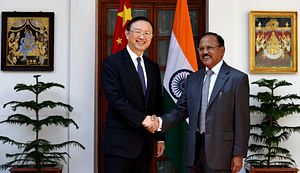Amid the Sino-Indian standoff at Doklam, Indian National Security Adviser Ajit Doval arrived in Beijing on July 27 and had a meeting with Chinese State Councilor Yang Jiechi. But while the world had been closely following the bilateral talks, China’s national media was busy playing it down.
On July 27, Xinhua, China’s national news agency, reported the meeting between Yang and Doval, but in a very low-profile manner.
Under the title of “Chinese state councilor meets senior representatives on security issues from S.Africa, Brazil, India,” Xinhua tried to bury the content related to India in the report. The report just simply mentioned that Yang “separately exchanged views with the three senior representatives on bilateral relations, international and regional issues and multilateral affairs, and set forth China’s position on bilateral issues and major problems.”
Although Xinhua didn’t single India out, most observers believed that the so-called “China’s position on bilateral issues and major problems” was referring specifically to the Doklam standoff and was addressed to Doval.
Except for the insignificant mention of Doval’s meeting with Yang in the article above, Chinese national media have made no other reports or comments about the meet so far.
Even more remarkably, this actually appears to be in line with the Chinese foreign ministry’s position. On the official website of Chinese foreign ministry, there is not a single piece of information specifically about Doval’s visit. In contrast, China’s foreign minister Wang Yi’s demand that “India should conscientiously withdraw” has been highlighted and posted in the front page.
That being said, the downplaying of Doval’s visit doesn’t necessarily mean that China doesn’t aim to eventually solve the Doklam standoff. As Doval’s visit is part of a series of meetings of officials from BRICS countries ahead of this year’s BRICS Summit in Xiamen city in September, and Indian Prime Minister Narendra Modi is also expected to attend the summit, China has every intention of making the summit a success in the end. That’s why Yang said that “China stands ready to work with all sides to prepare for the 2017 BRICS summit.” Undoubtedly, India should be one important side that China is keen on working with.
Meanwhile, it seems that India has also been trying to patch things up with China as well.
According to the above report of Xinhua, “Mahlobo, Etchegoyen, and Doval said they expect to further strengthen the partnership under the BRICS mechanism, expand cooperation in broader areas, and promote peace and development in the world.” To be sure, based on the report, we cannot sure who said which sentence. But the overall tone struck in the article was still positive.
Why then, is China’s national media purposefully downplaying Doval’s visit now?
Most likely, China is trying to manipulate the domestic public opinion in India, just like Beijing has always done in various disputes with foreign countries. The downplaying could provide China with more domestic leverage in the future, whether or not Beijing and New Delhi do or do not find a way to reduce tensions during this Doval’s visit or soon thereafter.
Charlotte Gao holds a MA degree in Asian Studies. Her research interests center around East Asian topics. She has worked in the past as a news editor, reporter, and writer for multiple traditional, online, and new media outlets.

































